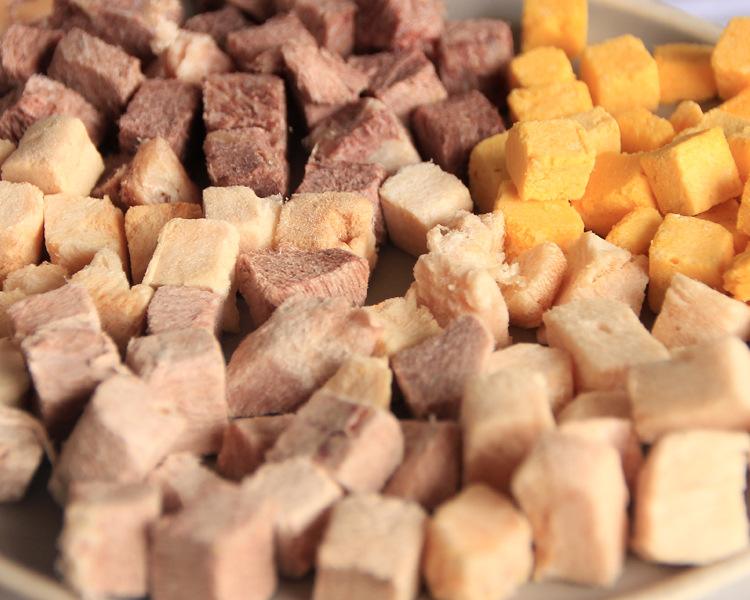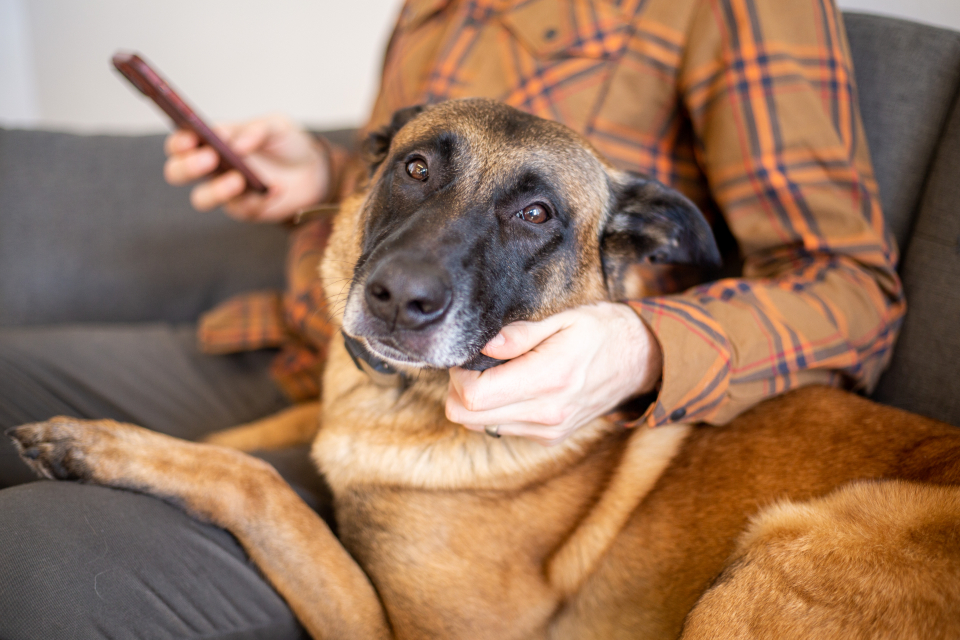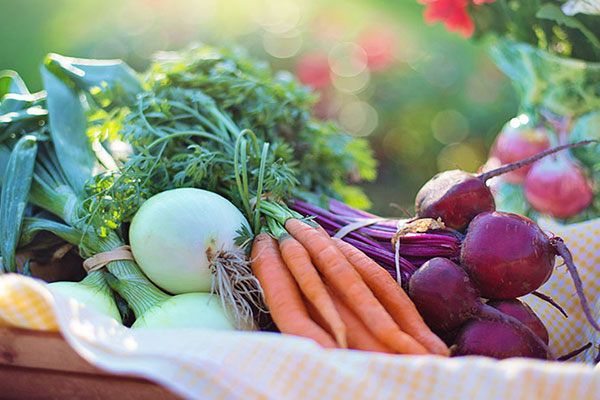Freeze-dried food, beloved for its long shelf life, rich flavor, and retention of nutrients, is becoming increasingly popular among people. We have noticed that more and more individuals are choosing freeze-dried foods for their canine companions, introducing dogs to a novel and delightful taste. But what are the advantages of freeze-dried dog food? Can it replace traditional kibble? Let’s explore the answers to these questions together.
Introduce Freeze-Dried Dog Food:What Is Freeze-Dried Dog Food?
Freeze-dried dog food is produced by using a professional freeze-drying machine to sublimate the moisture in the dog food at low temperatures, thereby preserving its original nutrients and flavor. In other words, this type of dog food retains all its nutritional content except for the water, making it a highly nutritious option for pets.

Advantages of Freeze-Dried Dog Food: Is freeze-dried food worth it?
- Retains Nutritional Content and Original Flavor The freeze-drying process sublimates moisture at low temperatures without removing other nutrients, maximally preserving the food’s nutritional value. Moreover, the food’s taste remains unchanged, making it an ideal healthy choice for pets.
- Long Shelf Life The freeze-drying process removes almost all moisture (in fact, household freeze-drying machines can eliminate up to 99.5% of moisture). This means bacteria struggle to proliferate, allowing freeze-dried dog food to last over 25 years under proper conditions.
- Convenient Storage and Portability Freeze-dried dog food is lighter and more compact, making storage and transportation much easier. This is especially convenient when you’re walking your dog or traveling outdoors, as you can feed your dog anytime, anywhere.
- Healthy and Easy to Digest Freeze-dried dog food closely resembles fresh food with minimal nutrient loss, making it easier to digest and absorb than traditional kibble and hence healthier. For dogs with poor digestion, freeze-dried food is undoubtedly the best choice.
- No Additives or Preservatives Since freeze-dried dog food contains almost no moisture, bacteria find it difficult to grow, eliminating the need for additives or preservatives. This makes freeze-dried dog food more natural and healthier than other types of dog food.
- Offers a Variety of Food Choices Freeze-dried dog food often uses a variety of fresh meats, vegetables, and fruits, providing diverse flavors and nutritional combinations for dogs, ensuring they eat well and healthily. Of course, if you own a home freeze-drying machine, you can DIY various flavors of dog food, creating the most suitable freeze-dried food for your beloved dog.
Considering all the above, freeze-dried dog food has many advantages and is worth purchasing.
Is freeze-dried dog food more expensive?
Freeze-dried dog food typically comes with a higher price tag compared to conventional dog food. This is largely attributed to its production process, which requires sophisticated equipment, consumes more energy, and involves a lengthier and more intricate cycle. The quality of raw materials for freeze-dried food is also superior, further driving up costs. Moreover, freeze-dried dog food brands often market their products as premium pet food, adding to the cost differential. For those considering freeze-dried food as a long-term option for their pets, home preparation of freeze-dried dog food could be a cost-effective alternative.
Can I freeze dry my own dog food?
Yes, you can. As mentioned earlier, with a home freeze-drying machine, you can freeze-dry a variety of nutritious foods for your dog. These machines are simple to operate, so there’s no need to worry about handling them. Although the price of a home freeze-drying machine can be several thousand dollars, it is a worthwhile investment in the long run.

Which is better freeze-dried or air dried dog food?
Both methods remove moisture from food, but air-dried dog food is dried at warm temperatures over a longer period, leading to some nutrient loss. Moreover, air-dried food doesn’t remove as much moisture as freeze-dried food, so its shelf life is shorter. However, air-dried dog food is cheaper than freeze-dried, so you can choose the most suitable option for your dog based on your situation.
Do Veterinarians Recommend Freeze-Dried Dog Food?
Most veterinarians approve of freeze-dried dog food. Some dogs may not be interested in traditional kibble, and freeze-dried food can significantly improve their appetite. Additionally, for dogs with health issues (such as poor digestion or food allergies), freeze-dried food is easier to digest and more natural and pure.
Do you have to add water to freeze-dried dog food?
Freeze-dried dog food can be eaten directly, but we recommend adding water before feeding it to your dog. This reverts the food to its original fresh state, improving its taste and making it easier for your dog to digest and absorb.The time it takes to rehydrate freeze-dried dog food can vary depending on the brand and the size of the food pieces, but typically, it ranges from 3 to 5 minutes.
What Happens If I Don’t Rehydrate Freeze-Dried Dog Food?
Freeze-dried dog food can be eaten dry, and some dogs prefer the crunchy texture. However, consider the following issues:
- Digestion Impact: If not rehydrated, freeze-dried dog food may affect digestion, especially in dogs with poor digestion.
- under-hydrated: If you often feed your dog freeze-dried food directly, make sure your dog stays well-hydrated to prevent potential dehydration issues.
- Nutrient Absorption: Although freeze-dried dog food is rich in nutrients, failing to rehydrate it can prevent pets from fully breaking down and absorbing these nutrients.

Let’s take a look at some common types of freeze-dried dog food:
- Freeze-Dried Meats Beef: Rich in protein and amino acids, it helps dogs grow and strengthens their muscles. Chicken: Low in fat and high in protein, nutritious for most dogs. Fish (such as salmon): Contains Omega-3 fatty acids, promoting healthy skin and shiny fur for dogs.
- Freeze-Dried Organs Organs (such as liver and heart) are rich in vitamins and minerals, making them excellent sources of nutrition.
- Freeze-Dried Vegetables Vegetables (such as carrots and pumpkin) provide fiber, vitamins, and minerals, aiding digestion. However, some vegetables (like onions and garlic) are not suitable for dogs.
- Freeze-Dried Fruits Fruits (such as apples and bananas) are nutritious and suitable for dogs, but some fruits (like grapes and cherries) should be avoided.
Freeze-dried dog food represents a new type of pet food, offering rich nutrition and a long shelf life compared to traditional pet foods. We hope this new method of food preservation brings health benefits to more dogs. If you want to learn more about freeze-dried pet food, you can also check out this article:Freeze-Dried Cat Food: A New Choice For Pet Food






